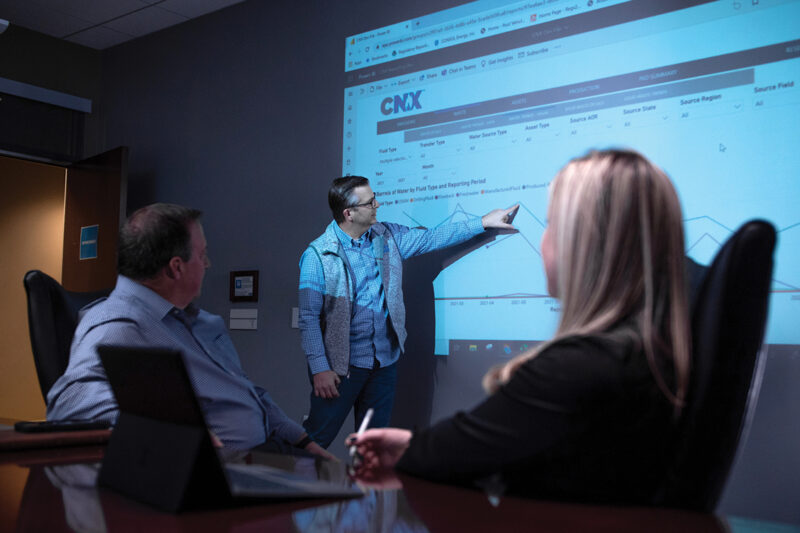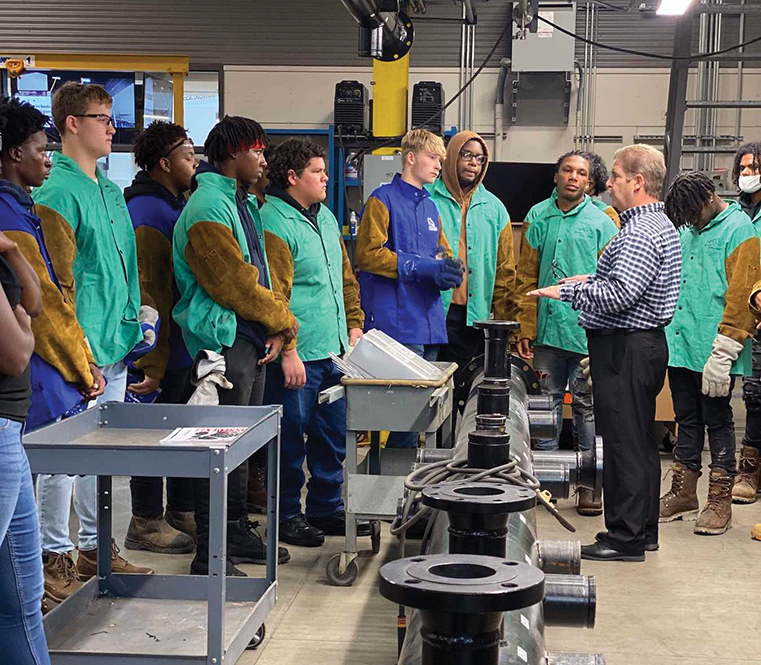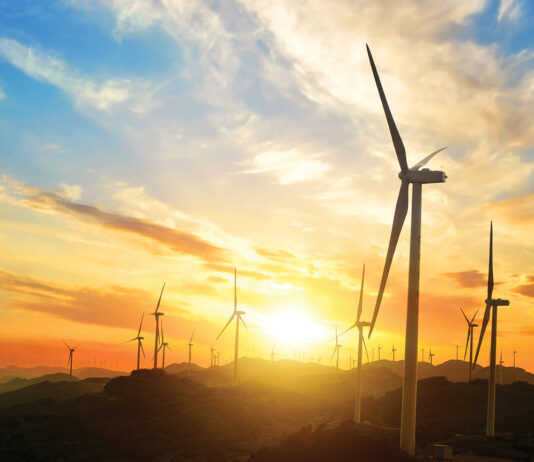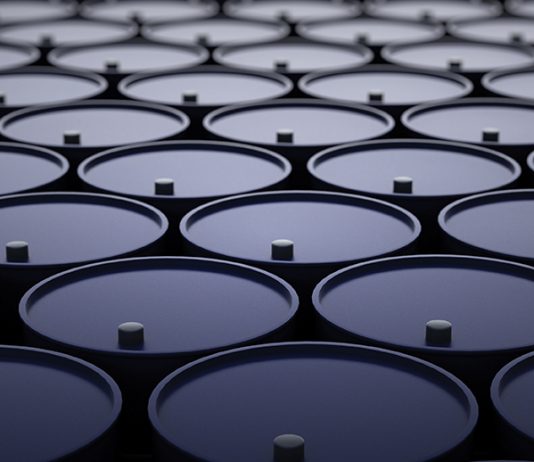
Russia’s invasion of Ukraine and the ensuing global fallout from that war have reminded global leaders of the critical nature of maintaining energy security for every nation. It is generally accepted now that Russian President Vladimir Putin would not have sent his army into that much smaller European nation were it not for the massive geopolitical leverage he held over the European continent, thanks to its dependence on Russian oil and natural gas to keep the lights on and homes heated during the winter.
Europe’s dependence on Russia and Putin for its own energy security was a voluntary decision. The continent is known to possess significant shale and conventional oil and gas resources of its own, but leaders there chose during the first decade of this century to virtue signal to the radical environmentalist movement by making hydraulic fracturing and drilling operations largely illegal. These leaders consciously surrendered their countries’ energy security as a result.
Many in Europe are fond of saying that “fracking” was uncompetitive in these countries, claiming that was the reason why these decisions were made. While that statement is accurate to the extent that the cost of producing shale gas via hydraulic fracturing and horizontal drilling was higher than making your country dependent on cheap gas and oil pipelined in from Russia, that simplistic equation obviously did not factor in the real costs of the choice. That real cost has now materialized in force this year in Ukraine, with a horrific toll in death and destruction that will have global consequences for years to come.
That equation also failed to factor in what the alternative might be should Putin and Russia ever decide to cut off that supply of cheap gas, as they have threatened to do in response to rising sanctions implemented by the U.S. and the rest of the free world. It’s important to remember that much of Europe was already experiencing an energy crisis before Putin’s invasion, one that began late last summer when the wind diminished across the continent, causing the wind industry there to fail to meet its lofty promises. Germany, the United Kingdom and other European nations were forced to scramble to secure liquefied natural gas (LNG) imports from places like Qatar and the United States to prevent their people from freezing to death in the dark long before the advent of the war in Ukraine. Indeed, in early December 2021, reporters at Bloomberg were able to document as many as 49 LNG tankers headed from the United States to Europe on a single day as exporting countries worked overtime to feed the energy-hungry markets on that continent. It was the largest flotilla of American ships to approach Europe since the D-Day invasion on June 6, 1944.
While “fracking” wasn’t competitive with the cheap Russian gas, its cost would pale in comparison to the prices Europe has paid over the last half-year for its LNG imports. Thus, the short-sighted decisions by European leaders to refuse to exploit their own mineral natural resources have come home to roost.
This emergency situation has not ended; in the wake of Putin’s war, it has only grown more severe. In March, the German government announced that, after shunning the installation of new natural gas infrastructure for more than a decade, it would commission the building of not one but two LNG import facilities on its coast to better facilitate these imports. The European Union said it would also work to find ways to speed the permitting of new natural gas infrastructure and help member nations to secure supplies of additional imports.
On Friday, March 25, President Joe Biden stood with European Commission (EC) head Ursula von der Leyen at a press conference where they announced an agreement that the U.S. LNG industry would dramatically increase its supplies of LNG to Europe in the coming years. It was later revealed that the president failed to consult with any of the major players in the LNG or oil and gas production business before making this commitment, and it was unclear what, if any, measures his administration would be willing to take to help ensure its success.
One thing was certain, though: If this Biden plan to help supply natural gas to Europe is to succeed, natural gas coming from the Appalachian Basin, home to the giant Marcellus and Utica Shale formations, would play a big role in making it happen. Nick Deiuliis, the CEO of one of the basin’s biggest and most long-lasting players, CNX Resources, says “the potential is massive.” “Our job is to manufacture free
cash flow safely.”
“The potential is massive,” Nick Deiuliis told us in an interview in late March. “There is no reason why this area, with its clear advantages in costs and scale, along with its close proximity to LNG export facilities, can’t play a big role with respect to the global energy markets and geopolitics. It could be a massive hedge against, say, the Chinese Communist Party or Vladimir Putin. That’s the potential.”

A native of the Appalachian region, Deiuliis knows about potential. Growing up in Pittsburgh, he talks about having a job as a paperboy for the Pittsburgh Press newspaper in the 1970s and ‘80s, a time before the news media became incurably biased. Reading the paper helped him become educated as a kid, and that paid off when he became the valedictorian of his graduating class at Chartiers Valley High School.
From there, it was onto Penn State University, where he pursued his degree in Chemical Engineering. Following his undergraduate years at Penn State, he obtained a job as an engineer with Consol Energy and has been with that organization and its successor companies for the last 30-plus years now. When Consol was split in 2005, Deiuliis became the President and CEO of CNX Gas Company, which later became CNX Resources.
But the history of Consol Energy and CNX began long before 2005. In fact, the company has existed in one form or another for more than 155 years. It goes all the way back to the Abraham Lincoln administration, when it was founded as a coal-producing company centered in Western Pennsylvania. All coal seams produce methane gas as a by-product, one that was a menace to coal miners.
For over a century, CNX’s main activity related to that methane was to find the most efficient way to remove it from the coal formation and either vent it into the atmosphere or, later on when regulations changed, flare it. “We got really good in the ‘70s and ‘80s at liberating methane from coal seams,” Deiuliis said, “to the point where towards the end of the ‘80s we said what if instead of venting the methane into the atmosphere or flaring it, why not collect it and process it? That’s really the genesis of how we got into the natural gas business.”
The original means of collecting, processing and selling the methane was via the drilling of vertical wells and hitting the rock with a small-ish hydraulic fracturing job—or “fracking—to release both the gas and the water that held it in place via formation pressure. With the advent of the shale revolution, those vertical wells eventually morphed into horizontal ones, the frac jobs grew larger, and the company eventually also started drilling into first the Marcellus shale formation and later, the Utica shale. Today, it is one of the prominent natural gas producers in the Marcellus/Utica region, with the bulk of its assets still centered in Western Pennsylvania and West Virginia. In our interview, Deiuliis told me that “I’ve lived my entire life within a 5-mile radius of my birthplace,” and his company’s history reflects a similar story. The two seem almost made for one another. Interestingly, Deiuliis talks about his company, not in the energy-related metrics and terms one normally associates with the oil and gas industry but as a manufacturer instead. What is most interesting is the product he focuses on as the company’s main product.
“We don’t consider ourselves to be an upstream or midstream or E&P company,” he told me, “we consider ourselves to be a free cash flow manufacturer. Our job is to manufacture free cash flow safely and efficiently, and then we want to be smart allocators of that capital. We want to make our bets with respect to how we’re investing that free cash flow in the right places and at the right time. Our true north is always going to be our long-term intrinsic value per share.” So, you won’t hear Deiuliis focusing on rig counts or wells drilled or production stats during his investor presentations — those are not the metrics he uses to measure performance. “We want to manufacture methodical free-flow cash generation, we want to de-risk the venture to the extent that we can do that, and then we want to allocate that free cash flow in the right place at the right time.”
It’s been a tremendously successful model for CNX Resources. So successful that the company now operates 4,400 wells and has over 1 million acres of opportunity landholdings in the Appalachian Basin. From his vantage point, Deiuliis can see the tremendous potential for the region, the industry, and his company to be major contributors to enhanced energy security not just in the U.S. but globally. But also, from that vantage point, he can see the pitfalls and limiters that must change for that all to happen.
Unlike most of his peers in the industry, Deiuliis is not only prepared to actively advocate for those needed changes, but he also sees doing so as his duty and responsibility. “Energy is geopolitics.”
“If we’re manufacturing methane today in West Virginia or Western PA at CNX, what I think of is which one of those methane molecules is going to stay within region, is going to provide affordable and reliable electricity for a small business owner, for the middle class, for the working poor in this region,” Deiuliis said. “Which molecule of methane is going to be transported to the southeastern portion of the United States to do the very same thing? Which methane molecule is going to end up being transported and put on an LNG tanker and is now going to protect Poland from Russia? Or Japan from China? Or which of those methane molecules is going to end up going to India or sub-Saharan Africa and help to pull the almost 2 billion people who live in this world without access to reliable, affordable electricity out of abject poverty?
“That’s what we do as an industry,” he continued. “And the ability to advocate for that qualitatively and quantitatively as to why that cannot go away under the laws of science and under math, there’s a responsibility to do so. You’re here for a reason: You advocate for your industry and your company. You advocate based on logic and math and science, and then you stick to the methodical execution that strategically reflects what you feel is the best path to deliver for your shareholder and your employees and your communities.”
It’s a responsibility he takes seriously. Two years ago, Deiuliis had no social media accounts — “I had no idea what to do with social media,” he says with a laugh. Today, he is all over Twitter and other social media platforms, advocating for his company and his industry. He has his own podcast. He has authored a book that is coming out soon. It is the complete opposite approach you see taken by most CEOs in the energy business.
“I feel there’s an ethical duty, a leadership responsibility, there’s a social purpose of a business to accurately and rationally advocate for what you do on behalf of society and why what you do is not in the past. It’s not a bridge that’s going to go away; it’s the present, and it’s the future. Particularly when mistruths are used to vilify what you do,” he answered. “When you think about what’s behind that, the domestic energy industry doesn’t produce a widget of methane: What it does is provide quality of life.
“That’s what we do as an industry. It’s not that complicated.”

One of the main topics Deiuliis spends time talking about is the influence of the ESG and climate alarm movements. He believes the “green” pretenses they promote have led to a set of perverse incentives and disastrous energy-related outcomes in recent years.
“I look at what’s going on in Europe with respect to geopolitics,” he said. “Because energy is geopolitics.” He believes it is no coincidence that Putin has done what he’s done in Ukraine at this moment in time and that the issue of Europe’s dependence on Russia for its oil and natural gas supplies is at the center of it. “It’s not a coincidence that all these things are happening at the same time,” he told us. “That creates leverage for [Putin] and for Russia.”

He also points to the spectacle America sees every winter of LNG tankers from other nations—frequently from Russia—sailing into Boston Harbor to provide natural gas to the New England states. “Boston is another case in point for all of this. Boston has embraced so-called renewables and the zero-carbon economy to the point where Boston and Massachusetts, and New York won’t allow pipelines to be built from Pennsylvania to Boston City Gate.


“It just defies logic that you would preclude a methane molecule from PA that is 400 miles away from Boston City Gate, and instead, you’re going to run into the arms of Russian LNG with a 4,000 mile supply chain. Think about what the carbon footprint of that is.”
Deiuliis also points to last year’s grid collapse in Texas as being by and large a result of a counterproductive set of subsidies and incentives put in place by virtue-signaling policymakers redirecting billions of investment dollars away from ensuring grid stability and adequacy and into the building of wind farms in West Texas, hundreds of miles away from the market centers they need to serve. “You’ve got billions of dollars of taxpayer money that’s going towards multi-billion dollar corporations via subsidies,” he said, “and a lot of that subsidization is being paid for by tax abatements in West Texas for the poorest school districts you will find in the state.
“How does that make any sense with respect to what’s sustainable?”
He points to a similar set of bad incentives that led to the devolution of what had been a world-class power grid in California. “You’ve got a grid in California that was a premeditated evolution from best-in-class, first-world to basically now third-world.” “I find the debate about infrastructure
to be ironic.”
Let’s go back to the subject of the U.S. supplying higher volumes of natural gas to Europe, which will become even more crucial should Putin decide to cut off Russian supplies to that continent’s energy-insecure countries. Again, Deiuliis believes the potential for achieving this goal is there.
Certainly, there is no question the U.S. possesses enormous quantities of untapped natural gas resources. “When you look at the size of our reservoirs, what our cost structure is and the replicability of our major producing basins, and the technology itself, the potential is absolutely there for Europe to basically trade Russian natural gas for U.S. natural gas,” he said. “Right now, Europe gets 40% of its natural gas from Russia, so we’re not talking about a small number here.”
But, while the resource definitely exists, the Biden administration has demonstrated since last January that it does not want the industry to be able to build the critical infrastructure necessary to facilitate the vast expansion of the domestic natural gas production and delivery systems that would be required to achieve the president’s ambitious goals. Indeed, it has become quite clear to the industry that using the permitting and regulatory processes at the Federal Energy Regulatory Commission (FERC), the Department of Energy and other federal agencies to slow and halt pipeline and other oil and gas infrastructure is a central element of the Biden energy and environment policy.
This led Deiuliis to say that “the reality is that this cannot happen today. And the reason it can’t happen today is that you cannot get the pipeline infrastructure built, not because there is a lack of capital or because the technology doesn’t exist or because the basins lack needed inventory depth to feed the pipelines for decades to come – that all exists. But you can’t do it because, once again, the state, regional, national and global bureaucracies frankly will not allow it.”
Deiuliis paused before continuing. “I find the debate about infrastructure to be ironic. It often seems as if half our government policy is designed to build infrastructure that nobody wants, that there really is no demand for in the real world: Like mass transit or EV charging stations, wind, solar, all this stuff. But then, the other half of the government, the afternoon of the day, is spent trying to drive regulation, policy, etc., to kill the other side of infrastructure that is in demand, that is needed and clamored for in the real economy and in the free market.
That’s what we do.


“When you look at 40% of European natural gas and what that equates to in terms of billions of cubic feet per month, that would come from the United States: Yes, we have the potential wherewithal to do that, but we do not have anything close to the infrastructure to be able to do that. And as I said, if we can’t get our policies situated in a way to where we can allow the modest investment needed to lay a pipe from Pennsylvania to Boston City Gate or to get a pipe from Appalachia to the Southeastern United States, how in the world are we going to get the order of magnitude greater volumes flowing from the U.S. to Europe?
“It’s a shame, but that’s the way things are, and we need to accept that. It’s why I say the duty and responsibility of this industry is to stand up and make the public aware of what the policymakers are doing and to show them the math of what this does to carbon footprint and CO2 emissions globally. We need to show what this does to people like Putin or the Chinese Communist Party and to show what it does to our own people with respect to the middle class, trade deficits, government spending deficits and everything else that goes with it.” “To me, Putin is a symptom.”
Deiuliis points to the philosophy of environmentalism — which he frequently refers to as a de facto religion — as the root cause of this current situation in Europe and globally. “Today, the true root cause of what’s going on with energy globally is not Putin, and the true root cause is not even the Biden administration. The true root cause is frankly an environmentalism that has created an ideology where effectively the earth is going to supersede the human being,” he said. “They’ve created this ‘zero carbon’ mentality that has relied heavily on a false accounting of carbon footprints, and the math and physics went out the window. “So, you’ve got this religion that’s driving policies, and when you look at what happened in Europe, you can just go through it sequentially: Europe shuttered its natural gas and oil fields; Europe willingly banned fracking; they retired coal and nuclear plants; and they embraced and relied on this costly and unreliable wind and solar energy. “Those were the policies that the environmentalist religion enabled, but now the math and physics have to take hold. Because when it gets cold, or it gets hot, the lights must come on, the home heating has to work, the businesses and factories have to run, and something has to be the plug to make the math work. In the case of Europe, they plugged it with natural gas, specifically with Russian natural gas.”
It was as a result of these conscious actions by virtue-signaling policymakers, Deiuliis notes, that “Europe had this energy portfolio that was far from optimal, from a geopolitical perspective, from a reliability perspective, from a cost perspective. Environmentalism, this ideology, was the root cause of that. It runs up the price and the cost of all forms of energy, including natural gas and oil; inflation starts raging because everything relies on energy in some way, shape or form, and then, when the cost of energy goes up, guess who benefits? The Russians benefit because of the lopsided balance of trade, and it’s not just oil and gas. They’re benefitting from nickel, grain, every commodity you can imagine.

“Somebody like Vladimir Putin and the Chinese Communist Party understands all of this. They like these environmentalist groups in the West, and they provide help to them. And they see this geopolitical weakness that’s occurred in the West due to our energy dependence, and they figure that their leverage is high, so they strike.” Indeed, it is a well-documented fact that, since the early years of the 21st century, Russia has poured millions of dollars of support into the U.S. and European anti-fracking movement. It’s a fact that, unfortunately, goes largely unmentioned by the biased news media and entertainment industries, which have been far more focused on demonizing the industry, thus essentially supporting Putin’s goals.
“To me, Putin is a symptom; he is a Frankenstein that has been created,” Deiuliis said. “Some of the policies and things like inflation and supply chain constraints, those are also symptoms. Root causes really go back to, if you do a really effective root cause analysis, it goes back to environmentalism and the policies that ensue from it.” “It’s not an issue of saying something that just didn’t age well.” Of course, the environmentalist religion has been extremely successful in pressuring America’s own virtue-signaling policymakers to incorporate their views into public policy. Not surprisingly, the pace of that success has accelerated during the current administration and the Democratic congressional majorities that share the leftwing environmental views and receive much of their campaign funding from that segment of society.
Not surprisingly, Deiuliis has strong and well-reasoned viewpoints on how that has all developed. “Historically, we’ve seen three major pinscher moves of attack on domestic energy from a regulatory and policy perspective:
One is implementing things that will slowly and incrementally increase the cost of producing something like natural gas or reduce the supply of it. It’s the one that’s been around for the longest time, and it’s also the one the industry has become the most adept at handling and adjusting to;
Second is this issue of infrastructure: The pipelines, facilities, etc. You see it now with housing developments that aren’t being allowed to be hooked up to natural gas; you see it in California with banning gasoline-powered landscape maintenance equipment — leaf blowers, lawnmowers and stuff like that. That is centered on not allowing the natural demand centers for oil and gas to develop. It’s trying to kill demand for it;
The third avenue of attack is the newest, and it’s what the SEC is aiming at. It’s a very methodical campaign to find a whole bunch of different ways and excuses to starve domestic energy of access to capital.
“You can see where this all goes,” he continued. “You can see it with SEC disclosure rules; you can see it with shareholder activism with the banks; we saw that in Europe with Credit Suisse, and I’m sure we’ll continue to see that with major banks in the U.S. that lend to domestic energy. You also see it with the Federal Reserve when it comes to things like a ‘climate stress test’ because the Federal Reserve has done such a great job predicting and controlling inflation that they can now predict future weather.
“You can see it across all these different data points, but it’s all working towards the same thing, which is to deny access to capital for the domestic oil and gas industry so we can’t do what we do. Which is ironic considering that the biggest, loudest proponents of that avenue of attack, and the biggest, loudest proponents of not allowing infrastructure to be built are the same ones who are now clamoring for more oil production domestically and access to all this resource.”

We asked Deiuliis what he makes of Energy Secretary Jennifer Granholm’s call in early March for the domestic industry to produce more oil, in light of all the myriad efforts by the Biden administration thus far to impede that from happening. Again, he found the Secretary’s remarks to be more than a little ironic.
“This was not something Granholm said in, say, 2018, and it just hasn’t aged well; this comment came literally in March at CERAWeek with everything that’s going on in the world. And our Climate Czar, John Kerry, didn’t make his comments about hoping Putin wouldn’t forget about his climate commitments while conducting his war on Ukraine a couple of years prior to the invasion; he said that literally as the invasion was unfolding.
“So, it’s not an issue of saying something that just didn’t age well in hindsight, which would be bad enough. What makes it incredulous from my perspective is that these comments are being made in a time when the world is literally falling apart, largely because of energy policies and climate change policies that have been driven by this ideology of environmentalism. The current administration has a massive credibility problem. It’s not political; it’s just straight-up credibility.”
He went on to note that the administration’s statements do not match up with its actions. “We look at what’s being said on one side, but then we look at actions that this administration is directly responsible for on the other side, and you cannot sync them up,” he said. “You have to question the veracity of what’s being said. It is pretty apparent that our climate czar cares more about those that are opaque and far into the future than about nations that are invading and literally killing citizens of other nations. That’s a problem. We are sending emissaries to Venezuela, one of the most brutal dictatorships you’ll find on the planet, and we say that it’s not about oil. But common sense tells you otherwise.
“We’ve bent over backwards to try to appease Iran, and you know, you can feel that we’re going to get a ‘deal’ one way or another, and the more likely a deal looks to happen, the more concerned I become, not as an energy businessperson, but as an American citizen. That deal cannot be good for the world. So, why are we doing it? Well, I think we know why we’re doing it, despite the reasons why the administration claims we are doing it.” Obviously, it is, at least in part, about oil.
He continued: “The administration publicly takes the Saudis to task for some of their troubling issues, including the murder of a journalist. But then, we turn around and suddenly want to meet with them, and they won’t take our phone calls. And we say it’s a scheduling issue and it’s not about oil. I wonder why that’s happened. Then, we see things like the nomination to the Federal Reserve of Ms. Bloom Raskin, and what her record has been with her views that carbon-based companies are going to be worthless: That’s a comment that certainly hasn’t aged well.
“Then, with Russia, these ‘unprecedented’ sanctions: The one sanction we didn’t see with Russia was the key bank within Russia that does all the energy and commodity trading. There’s a reason we didn’t do that. We see all these actions, and then you hear the comment from the Energy Secretary, and a reasonable person has to wonder if that comment is sincere.” Effective Advocacy Comes in Many Forms When it comes to advocacy, Deiuliis doesn’t consider himself a one-man show. He and his team have developed a diverse set of internal and external programs designed to get the message out and inform the public about the industry’s benefits.
Internally at CNX Resources, employees are encouraged to set their own advocacy goals. “One of the side benefits of my doing all of this is that it fires up the employee base, and some individuals decide they also want to go out and advocate. We have certainly seen that. Brian (Brian Aiello, CNX’s Vice President of External Relations and Human Resources) and I debate continually about how to go about encouraging it. For the introvert, that could be something as simple as talking to your next-door neighbor; for the extrovert, it could be to go out and make presentations.
“We set what we call smart goals every year that are tangible and measurable, which is how we measure performance. I’ve got them, as does every other employee in the company. For employees who are comfortable with it, we’ve been aggressive in helping them find their voice on how to do the advocacy.”
Externally, CNX has structured and funded a very innovative program of public education, attracting students both from central Pittsburgh and the rural areas surrounding the city to participate in what Deiuliis calls the Mentorship Academy.
“While this was all going on and the world was unfolding like it is,” he began, “within the company we came up with the idea for what we call a Mentorship Academy. This goes back to the premise that those in the entrenched power and institutions in our region, there’s this constant drumbeat from a very early age, from parents to kids, that if you don’t go to college, you’re a failure.” With skyrocketing tuition and fees and the academia model of public education failing to produce an acceptable rate of return on student investments, Deiuliis and his team believed there must be a better way than just criticizing students and almost giving up on them if they don’t attend college. “We have this broken model, and yet there’s this view as a parent or as a student that you’re a failure if you don’t go to school.
“Meanwhile, we’ve got this industry that is paying family-sustaining wages, and much of the work, especially at the entry-level, does not require a college degree: you just need a high school education. We came up with this idea that takes all those facts into account and takes this Western PA region into account.
“Our office is kind of in the middle of suburbia, but within a half-hour drive to the north, I can show you the most urban of urban areas that you can find anywhere in America, and a half-hour drive to the south, I will show you the most rural of rural areas anywhere in America. They both have great things going for them, and they both also have huge challenges.
“What if we took a class of high school seniors and a few high school juniors, and we took them from these under-served rural school districts and these under-served urban school districts, and we brought them all together once a month for this Mentorship Academy? We were looking exclusively for kids that show up every day for school but who do not have an intention to go to college, and they want to stay in the region.
“We show them all the different kinds of professions and careers — not just jobs, but real professions and careers — that you can embark upon in the private sector without a college degree. We provide them with hands-on experiences, let them try things out. Some are building trades-based, a lot are manufacturing trades-based. We took them to the petrochemical facility in Beaver County. We took them to meet operating engineers in the building trades; we talked to carpenters, steamfitters, ironworkers, and of course the energy industry.
“It’s been a really interesting program. The gulf of knowledge between the high school student in the region and what’s going on around them in the industries and the enterprises in this region is shocking. I think that advocacy can be the bridge for that. Now, these kids have a broader understanding of this, and now the leaders in those communities start to take notice of the benefits as well. You can see this cross-pollination, this linking and understanding sort of dawning on a whole bunch of people within the region.”
Advocacy comes in many forms, and in today’s world, effective advocacy is more crucial than ever for America’s oil and natural gas industry. Among the current set of industry leaders, no advocate has proven himself more effective than Nick Deiuliis.
About the author: David Blackmon is the Editor of SHALE Oil & Gas Business Magazine. He previously spent 37 years in the oil and natural gas industry in a variety of roles — the last 22 years engaging in public policy issues at the state and national levels. Contact David Blackmon at [email protected].
















